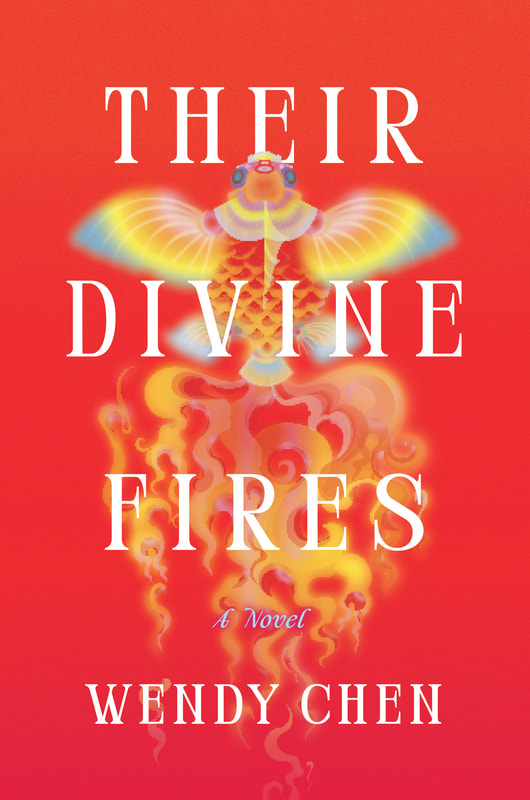 Thanks to partners NetGalley and Algonquin Books for the digital ARC of Wendy Chen’s Their Divine Fires. The book will be published on May 7! Wendy Chen’s Their Divine Fires comes in at only 256 pages, but that length is deceptive: this is a sprawling, multi-generational tale of three generations of Chinese women that takes the reader from 1917 Liuyang, China to 2009 Massachusetts, United States. Chen’s novel, inspired by the experiences of her own ancestors, begins with the story of a young girl, Zhang Yuexin, living with her family, including her two brothers, in Liuyang. Yuexin is devoted to her oldest brother, so when he cuts his traditional braid, angering her parents, Yuexin cuts her hair, as well. This initial symbolic event sets the stage for unrest: the family is broken when her oldest brother leaves to join the Revolution, setting them on a path that will have unexpected effects on them all. After her brother leaves, Yuexin’s young life is again altered forever when she saves Tan Haiyang, the young son of a local wealthy lord. He stays with the family while Yuexin’s father, a doctor, cares for him. Yuexin and Haiyang form a strong connection, but once he returns home, it seems likely that they’ll never see each other again, driven apart by the distance in their families’ situations. The only hope is that he felt the connection as strongly as Yuexin did. The narrative captures the effects of this Revolution, the ways that its aftermath cycles through the generations, moving through the Cultural Revolution of the 70s to the diaspora who make their way to the United States. Chen’s writing is stunning, and her sense of character is so vivid. Watching the way that early generations appear again later, the ways that ancestors affect their descendants, offers powerful commentary on the cycles of history. Despite the depth and power of its content, Their Divine Fires is a propulsive read, and I can’t recommend it enough.
0 Comments
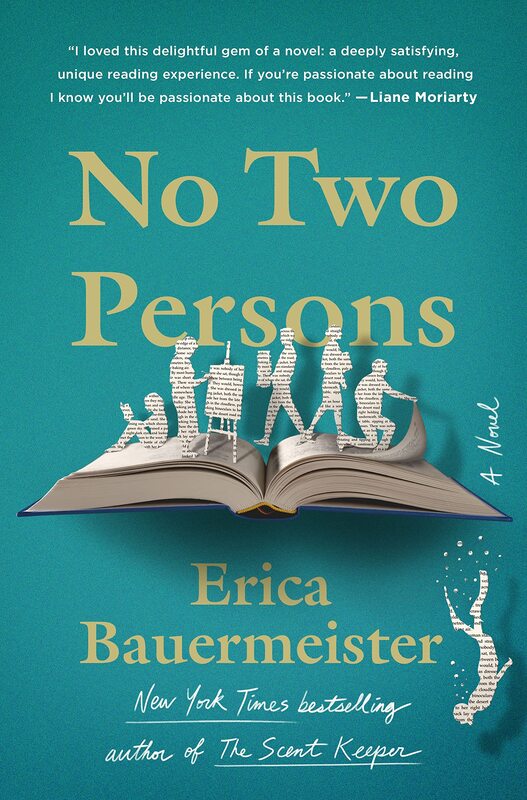 Thanks to partners NetGalley and St. Martins Press for the digital ARC of Erica Bauermeister's No Two Persons. The book will be published on Tuesday! It’s easiest to explain Erica Bauermeister’s No Two Persons through its premise: the book is a series of interconnected short stories centered around a book called Theo. Bauermeister’s novel begins with Alice, the author of Theo, exploring the origins of the book, which are connected to her own life, though it’s not completely autobiographical. Each new section explores the presence of Theo in the life of someone new—the artist who designs the cover, the assistant of the literary agent who discovers it, and myriad readers. Through the short stories, characters reappear—we see Alice more than once—weaving a tribute to the power of books in our lives, the ways that they can change the way that we see ourselves, each other, the world. The writing here is just gorgeous, and we see enough of Theo to have an idea of a book, though this isn’t completely a book-with-a-book situation (so there are no long passages of Theo building into the inclusion of the book in its entirety). Instead, it’s the idea of this novel, of the way it’s one thing for Alice and another thing for each person who comes into contact with it, that captures our attention. The title comes from a quotation about no two persons experiencing a book the same way (and there’s a great story at the end from Bauermeister about the origins of the quote), and the way Bauermeister brings life to that concept resonated. There’s deep empathy here, a nuanced understanding of the fact that we can only know the smallest part of the lives of most people we know but also a strong message that empathy can—and should!—arise from even that limited knowledge. I think that anyone who’s a reader, anyone who has seen the way a book can touch someone deeply, anyone who has the urge to share a book with someone they know, will love this book. 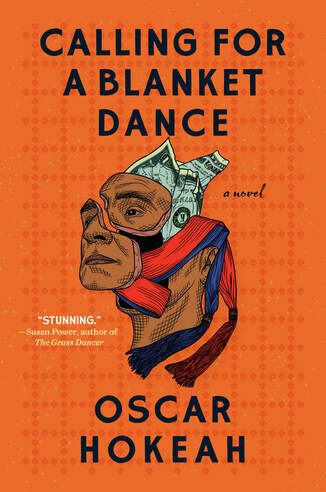 Thanks to partners NetGalley and Algonquin Books for the digital ARC of Oscar Hokeah’s Calling for a Blanket Dance. Oscar Hokeah’s Calling for a Blanket Dance is a combination of novel and connected short stories, a consideration of the life of Ever Geimausaddle. Ever’s father immigrated from Mexico; his mother’s ancestors are members of the Cherokee and Kiowa nations, and Ever moves, through the book, between his different heritages. Beginning in 1976, when Ever is a baby, the narrative shares Ever’s story through a multitude of voices. We hear from his grandparents, his mother, his sister, his aunts, distant relatives . . . but not, for the longest time, from Ever himself. The voices are distinct and opinionated, and they drive home the way the truth of someone can shift both because of the point of view of the storyteller and because we, as people, grow and change. There are some recurring themes through the book, traditions that serve as anchors and which older generations are often striving to pass on to keep them alive. There’s a reverence for ceremony but for a ceremony that is alive and that changes with those who are enacting it. Hokeah’s writing is stunning, and this is a book that I’m sure I’ll be revisiting. Calling for a Blanket Dance has become one of my top reads this year. 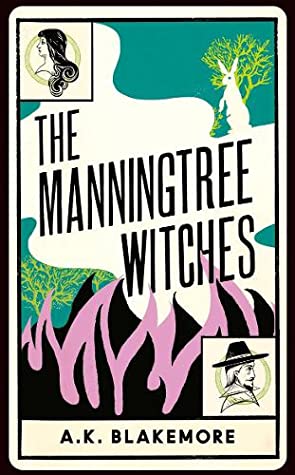 Thanks to Partners NetGalley and Catapult for the digital ARC of A. K. Blakemore’s The Manningtree Witches in exchange for an honest review. The book is out on Tuesday, August 10! I taught Arthur Miller’s The Crucible for a long time at the school where I used to teach, so I’ve dug into the Salem witch trials more than once. Parts of them still resonate: misogyny and class conflict, greed and corruption, and (of course) witch hunts both literal and metaphorical. Miller saw in the witch trials an allegory for the McCarthy trials and the obsession with unearthing communists in 1950s America, and they definitely can stand in for many modern obsessions. A.K. Blakemore’s The Manningtree Witches deals with witch trials in a 17th century English town, and while I’m sure there’s symbolic resonance there, too, it’s the sheer humanity of her novel that struck me. Through much of the book, the voice and point of view we’re following is that of Rebecca West, the daughter of a single mother who has spurned any chance of popularity by her irreverence, her cruelty, and her refusal to follow the rules of the town. Rebecca is more willing to please than her mother, but she’s got strength and independence of her own. Rebecca’s voice is vibrant and funny and wicked; her intelligence is apparent, as is her search for identity and love and comfort and companionship. When a stranger moves to town and begins asking questions about some animals who’ve died, some women who’ve miscarried, a boy who falls ill, it doesn’t take long before the town begins to catch his fervor, and, as always, it’s mostly women—and mostly single women—who are the focus. Rebecca loves her mother but doesn’t always like her, and so at first, the scrutiny satisfies her own cruel thoughts that result from her mother’s casual unkindness. But soon, Rebecca realizes that the accusations are insidious, weaving their way through the minds of the townsfolk. The events of the novel follow a familiar pattern, but their execution makes this a new and unique account. Blakemore builds brilliant characters who are trying to find small bits of happiness despite difficult circumstances, who revel in their friendships with other women who live lives similar to theirs. The writing is fantastic (I marked so many quotations!), and Rebecca feels just absolutely real. This is a confident, compelling debut novel, and I’ll definitely be looking out for Blakemore’s next book. 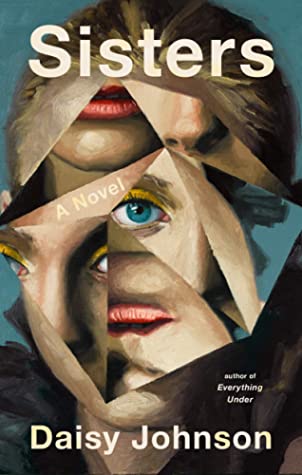 Thanks to Partner NetGalley for the digital ARC of Daisy Johnson’s Sisters in exchange for an honest review. The book will be published on Tuesday, August 25, 2020. Daisy Johnson’s Sisters is a gorgeous, mind-bending sliver of a novel. Though it’s only 220 pages long, it immersed me in a world as disorienting to me as it is to its protagonist, July. At the beginning, here’s what we know: July, her sister September, and their mother Sheela have escaped to a home called The Settle House near the sea in North York. They’ve been driven there by the outcome of a mysterious incident at the girls’ school. July has been the victim of bullying, and September--ten months older--is her constant protector, a shield for whom vengeance is routine. It becomes clear, however, that September also wields power, that her strength can be diminishing for July, who always gives in to September’s dominance. As Johnson unveils the history of this family, including the absent father whose behavior may have been the model for September’s actions, I was drawn into July’s understanding of the world. She often has trouble separating her own perceptions and experiences from September, and though she occasionally tries to assert her individuality, she is drawn again and again into September’s influence. The course of the novel, told in gorgeous prose, is winding and surprising. Daisy Johnson’s development of her characters and their perspectives--she occasionally alternates points of view--is both surreal and real, portraying vividly the minds of these women. After loving Sisters so much, I will definitely be visiting her backlist! 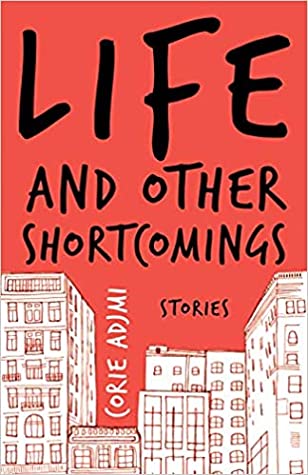 Thanks to Corie Adjmi for the ARC of Life and Other Shortcomings in exchange for an honest review. The book will be published on Tuesday, August 4. Corie Adjmi’s short story collection Life and Other Shortcomings circles around a central group of friends who we meet in the first story. “Dinner Conversation” introduces three couples whose ties originated in different ways: childhood friendships, new meetings, parenthood. The connections seem tenuous at times, but as Adjmi builds her collection, she reveals the subtle whims of all relationships, the way that friendships can be cemented or shattered in a moment. Adjmi’s writing is spare and beautiful. There’s a subtlety that means the power of each story sneaks up on the reader, building to climaxes whose impact can take time and thought to process. These epiphanies hit harder because of their gentleness: they aren’t huge, obvious moments but instead minute shifts of perception. Even without the power of the stories, I would have loved this book because of the writing. I found myself digging into my tin of book darts on nearly every page, eager to mark each perfect turn of phrase. I was enchanted by Adjmi’s exploration of the transforming definitions of parenthood; of the truth of what holds couples together; of the rules that we’re willing to accept and those we feel compelled to challenge. The idea that we cherish most those things that are denied to us permeates the collection. There’s joy in finding the connections between the stories, in completing the puzzle of each character, that stayed with me through the book. I found Life and Other Shortcomings to be a beautiful, satisfying reading experience, and I absolutely look forward to devouring Adjmi’s next book.
At the time, I'd read several other books by Kingsolver, and for some reason, I didn't enjoy The Poisonwood Bible. Since that time, I've remembered that--though I love Kingsolver--this book was my least favorite of hers. What was I thinking?! This novel blew me away. "Everything you're sure is right can be wrong in another place" (505). It's the story of the Prices, a missionary family from the Southern United States who travel to the Congo in 1959, completely unprepared for what they'll find. The women are the true stars of this narrative: mother Orleanna and the family's four daughters are dragged along by patriarch Nathan. The narrative alternates between those five distinct female characters--I could not believe how unique each voice was. I didn't even need the chapter headers to know who was speaking. The book, which covers decades, is wide ranging. Nathan, determined to convert the Congolese, can hear no voice and see no perspective but his own. He is both a realistic character and a symbol for the colonialism that has intruded on the Congo--first the Belgians, who maintain a presence despite their official surrender, and then the British, Americans, and Soviets, who each seek to maintain influence so they can take advantage of the country's resources. Nathan's family initially is so focused on the life they left that they can't see their own situation or the lives of those around them clearly. But as they continue to live in the Congo, they come to understand the type of power they lack and the ways that they can work around that absence to assert their independence in spite of it. Coming to know each woman here was my favorite part of this book--Kingsolver is such an amazing writer (I was employing my book darts liberally!), and though I found gorgeous sentences and thought-provoking ideas everywhere, I never confused Rachel's vanity and superficiality with Leah's toughness and determination to do what's right, or Ruth May's attempts to escape her birth-order fate as the youngest to move ahead with Adah's brilliant--and silent--determination to opt out of the demoralizingly mundane daily life of her family. Orleanna narrates her sections from decades after the Prices have left the Congo, and her reflection of what she lost and, perhaps, gained there gives her sections a resonance that is both painful and keen. "There is not justice in this world. Father, forgive me wherever you are, but this world has brought one vile abomination after another down on the heads of the gentle, and I'll not live to see the meek inherit anything. What there is in this world, I think, is a tendency for human errors to level themselves like water throughout their sphere of influence. That's pretty much the whole of what I can say, looking back. There's the possibility of balance. Unbearable burdens that the world somehow does bear with a certain grace" (522). Most of all, there's a beautiful sense of place here. Kingsolver--through research and travel to other parts of Africa (as she explains in her Author's Note)--communicates the brutality and eminence of nature, the ways that despite the Prices' attempts to control their world, it doesn't take long for the land of the Congo to erase the evidence of their existence. I could not have loved this book more, and I'm so glad to have the chance to be reminded, once again, that we never read the same book twice, that as we change, our responses to and understandings of the books we read necessarily change as well.
|
AuthorI'm Jen Moyers, co-host of the Unabridged Podcast and an English teacher. Archives
July 2021
Categories
All
|
Proudly powered by Weebly
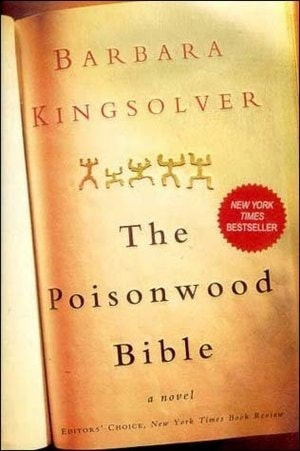
 RSS Feed
RSS Feed